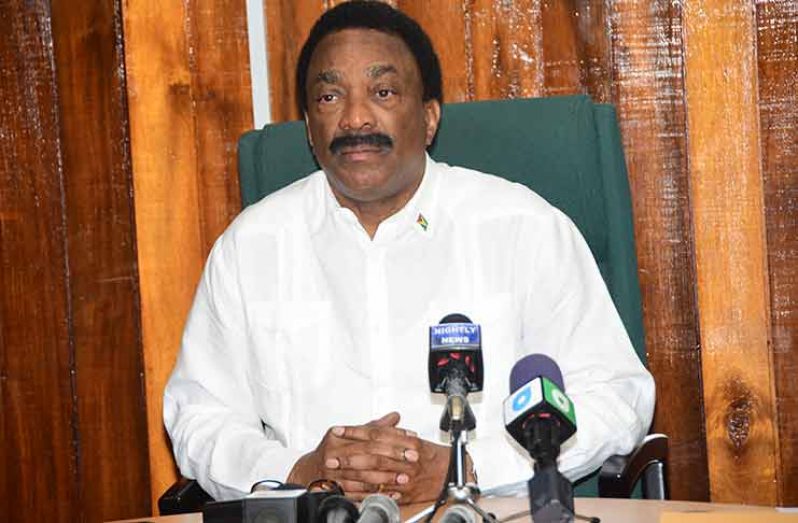ATTORNEY General and Minister of Legal Affairs, Basil Williams, on Tuesday, vowed that, despite the setbacks and pushbacks, Guyana, with the coming of oil, will one day build its own Law School.
Speaking to reporters at his Carmichael Street Office in the presence of a number of law students, Minister Williams said it has always been his vision to establish a law school here but his attempts to do so since taking office in 2015 have been met with major objections from the former Attorney General, Anil Nandlall, and the Council of Legal Education (CLE).
He recalled that it was in January 2017 that the A Partnership for National Unity + Alliance for Change (APNU+AFC) government announced the project for the establishment of the Joseph Oscar Fitzclarence (JOF) Haynes Law School of the Americas, after some two decades of lobbying for an alternative to the Norman Manley Law School in Jamaica, the Hugh Wooding Law School in Trinidad and Tobago and the Eugene Dupuch Law School in The Bahamas.
But the announcement was met with objection from the former Attorney General who contended that the CLE never granted or initiated discussion on the proposed school but when documents surfaced indicating that the matter was of active discussion, Williams said there were more stumbling blocks.

In 2018, the CLE indicated that the feasibility study submitted on the school was not in compliance with the treaty under which it was established. It was explained that the CLE does not provide for third parties, and the model proposed by the Guyanese Government was by way of a Public Private Partnership with the Law School of the Americas and the University College of the Caribbean. Since then the project has been stalled but Minister Williams, on Tuesday, assured the law students and reporters that, despite the moving goal post, a law school will be built here. “…So the goal post keeps shifting but fortunately, I am not sure that you can shift oil and gas, that have already been identified. So we will have a school, one way or the other,” he told reporters.
With the coming of oil, it would be easier for Guyana to have its own law school, he said while positing that the necessary resources would be available. “With Oil and Gas we will have a Law School,” Minister Williams iterated. He suggested that Guyana could model its law school after the Eugene Dupuch Law School in the Bahamas, explaining that during the early years of the school it operated independent of the CLE, and during that period, Bahamian lawyers practised in The Bahamas until the school was placed under the aegis of the CLE.
“So perhaps, if you have a Law School built in Guyana and Guyanese lawyers are graduated, they practise in Guyana. I don’t know that they need to go anywhere else to practise because here is where the money will be and opportunities, and of course, like the Bahamas, CLE overtime will be glad to embrace us,” the Attorney General reasoned.
Under the current agreement with the University of Guyana, the University of the West Indies (UWI) and the Council of Legal Education (CLE), only the top 25 Guyanese graduates from the University of Guyana are given automatic entry into the Hugh Wooding Law School on a yearly basis. This has resulted in hundreds of other graduates being left out in the cold though successfully completing their Bachelor of Law Degree.
However, with the coming of oil and the country’s push to become a green state, the Attorney General is almost certain that Guyana will no longer have to limit itself to approximately 25 lawyers per year when in Trinidad and Tobago, and Jamaica more than 250 lawyers graduate from the Hugh Wooding and Norman Manley Law Schools annually.
The February 2018 Final Report on the Survey of Legal Education in CARICOM Member States, which was conducted by the Improved Access to Justice in the Caribbean (IMPACT Justice) and funded by the Canadian Government, underscored the need for Guyana to have its own law school. In that report, it was recommended that law schools should be established as part of Utech in Jamaica, UG in Guyana and possibly in Antigua and Barbuda.
According to the report, the establishment of additional regional law schools in the three jurisdictions under the CLE would provide an easy mechanism for addressing the unsatisfied demand for access to practise law by the many persons who are holders of non-University of the West Indies (UWI) LLB degrees. The Attorney General said Guyana is in support of the report’s recommendation that the CLE should be an accreditation body and not one that manages the affairs of the law schools. He said this very important recommendation will likely come up for discussion during a meeting of the Legal Affairs Committee of CARICOM and at the level of CARICOM Heads of Government.



.jpg)










